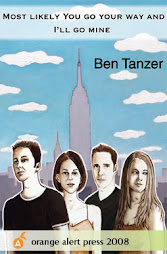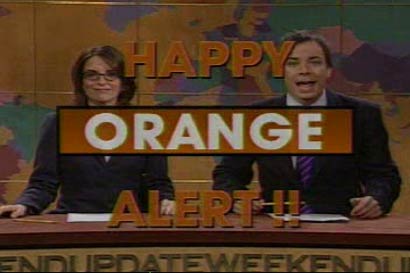
Jason Jordan
What does it mean to be experimental? Initially, I felt that this label may have a negative connotation, seeing that one definition of the word is unproven. However, without experimentation there is no advancement, and this Indiana native is definitely advancing the principles and overall aesthetic of the short story. Jason Jordan not only has wildly inventive content and character's, but the utilization of fonts, images and page breaks keeps the reader captivated.
His debut Powering the Devil's Circus consists of pieces of short fiction ranging in subject matter from cat worship to the love life of a tube, and of course the namesake autobiographical novella. The novella follows Jason through a Christian high school and then college at Indiana University Southeast. It really maps his journey thus far, and gives the reader a glimpse at what is on the horizon.
Recently, Jason took some time out from worshiping his cats and running decomP to answer a few of my questions.
Orange Alert (OA): The novella portion of your book seems at times to be more of a journal of your life up to this point. The names haven't even been changed to protect the not so innocent. If this is the case, how did you decide to speak with such truth?
Jason Jordan (JJ): It should be noted that most of the names weren’t changed. In fact, I can only think of about three characters, based on real people, whose names I changed. A few characters were entirely made-up, but of those who weren’t, I felt that I represented them both accurately and fairly. If I said anything too negative, I changed the name simply to protect myself. Overall, I didn’t feel the need to disguise the nonfiction parts of the novella, nor did I think I’d step on anyone’s toes by relaying my version of the truth.
OA: How difficult was it to write an ending to a story that has really just begun?
JJ: The ending of the novella was pretty difficult to write because I wasn’t sure what was gonna happen after the time or the during the time in which I finished it. I did know, however, that I’d most likely leave Louisville – for school or work – so I did have something to go on in that respect. But yeah, it’s not easy offering closure, while avoiding a cliffhanger, to a story that has no foreseeable end in sight.
OA: What is it about the Christian upbringing or education that pushes so many people in the opposite direction?
JJ: When you’re consistently beat over the head with something, the natural reaction is to either fully embrace it or fully reject it, I think. In addition, I believe one of the things that dooms many young churchgoers/Christians is the overprotective nature of their parents, so that when they do have the freedom to experiment (drinking, drugs, sex, etc.), there’s a greater chance they’ll enjoy these so-called taboos, which may be instrumental in leading them astray. The upbringing never leaves you, though. Not a day goes by that I don’t think about God, or the idea of God, in some capacity.
OA: You mention both Mike Smith and Mickey Hess frequently in "Devil's Circus". How has their work and their presence in your life affected you as a writer? Who are some of your other literary influences?
JJ: The influence of them on me was great since they were the ones who got me interested in writing in the first place. I admired the work they were doing, and still do, but I think they showed me that writing is very much alive, and that there are others out there who are writing great things, and that it’s possible to get involved in a community, which is incredibly gratifying.
There are a handful of writers who’ve really impressed me over the past few years, but early on, I’d say I was most impressed by Donald Barthelme, Charles Bukowski, Haruki Murakami, George Saunders, Rupert Thomson, Hunter S. Thompson, and Kurt Vonnegut. As for my contemporaries who I’ve interacted with at one point or another, Al Burian, Elizabeth Crane, Debra Di Blasi, Todd Dills, Joe Meno, Nick Ostdick, Kevin Sampsell, Patrick Somerville, Ben Tanzer. Mickey and Mike, too, of course!
OA: I've heard the word "experimental" used to describe your work. In fact it is on the back cover of your book. Personally I enjoy the shifting fonts and changing formats in the short pieces, do your consider yourself experimental?
JJ: I suppose so. It’s difficult to accept a categorization, though, when you don’t necessarily always write in one vein. For instance, I’ve been going through a period where I haven’t written anything I’d call experimental. I’ve mostly been writing either literary or surrealist fiction. But, since I’m in the MFA program at Chatham, I’m being forced to stick to a concrete deadline with stories, so I’m beginning to experiment again. My newest work is akin to “Tube,” “Being a Friend Means,” and other stories that take liberties with format, etc. I get bored easily if I stick to traditional storytelling for too long, which is probably why I have the urge to switch things up so much.
OA: You recently took the helm of the on-line literary journal decomP. Were you as surprised by Mike's decision as the rest of us were? What are your plans for the future of the journal?
JJ: I was and wasn’t surprised by Mike’s decision to step down from decomP. On the one hand, Mike did a great job using the resources he had to turn the zine into a flourishing, online publication. On the other hand, by the time he’ll be finished with it, he’ll have run it for three and a half years. At a certain point, I could sense that he was losing his enthusiasm and drive, plus everyone gets burnt out after a while. I mean, he put a lot of work, time, and money into it. Even so, I’m glad he stayed on to witness decomP gain in popularity rather than fade from disinterest. I remember when we wouldn’t receive submissions for weeks on end, but at the time we closed submissions for the year, we were getting several a day.
I can’t say I have grandiose plans for decomP, but optimally, what I would like to eventually do is pay our contributors and publish a print edition. I doubt the latter would adhere to a regular schedule, though. We’ll see what happens, and perhaps the fifth anniversary would be the time to act on one or both of those proposals. Regardless, in January ’08, decomP’s web address, submission email address, and submission guidelines will change, so be on the lookout in the new year. The January issue will be a sparse offering while I’m adjusting to web design, among other responsibilities that come with running a zine. We won’t have any reserve acceptances, either, so we’ll need a couple weeks, I’m sure, to have a full issue ready for publication. February will be the true return. Lastly, I’ll probably be in the market for an Assistant Editor who’s able to sift through poetry submissions. Keep an eye open if interested.
OA: What's next for Jason Jordan?
JJ: Lists are fun, so here’s one in order of importance:
- finish my M.F.A. in Fiction Writing from Chatham University
- get a job teaching writing at a college/university OR obtain a Ph.D. and then start teaching
- get a literary agent
- find a publisher for my novel The Dying Horse
- find a publisher for my second collection Hundreds of Feet in the Air
Bonus Questions:
OA: Coffee? If yes, what is your favorite type of coffee and where is your favorite coffee spot?
JJ: Yes! I love coffee, and drink it every day. I take it either hot or cold, but always black. No cream. No sugar. For some reason, I gravitate towards Latin American coffee (from any LA country, really), and coincidentally, I’m also taking a grad-level Latin American Literature course this semester.
I have a couple different coffee spots. In New Albany, it’s Coffee Crossing. In Louisville, it’s the Heine Bros. Coffee on the corner of Easter Pkwy. and Bardstown Rd. My Pittsburgh hotspot is TBD.
OA: We all know you are metal head, so I will challenge you to list your top 5 metal albums of all-time.
JJ: This question is so difficult because I can either list my top 5 albums based on history and taste, or I can stick with just taste. I’m gonna ignore historical significance and base my picks on taste alone.
In alphabetical order:
Agalloch – Ashes Against the Grain
Cynic – Focus
Dream Theater – Images and Words
Emperor – Anthems to the Welkin at Dusk
Megadeth – Rust in Peace
 The Illuminea contest ended this week, and we have chosen a winner (pulled straight from the Cubs Hat! Go Cubs!). Here is the winning playlist:
The Illuminea contest ended this week, and we have chosen a winner (pulled straight from the Cubs Hat! Go Cubs!). Here is the winning playlist: Amore!Phonics announced this week that they will be rereleasing two out of print Viva Voce albums as a double disc LP. "LOVERS, LEAD THE WAY!" and "THE HEAT CAN MELT YOUR BRAIN", originally released in 2003 and 2004 respectively, both of these sought-after albums have long since been out of print. Together nearly a decade, Anita Robinson and Kevin Robinson have been a consistent force in indie music and now they are finally receiving the recognition that they are due. Listen to: "Fashionably Lonely" (from Lovers, Lead The Way!) (mp3) and "Free Nude Celebs" (from The Heat Can Melt Your Brain) (mp3)
Amore!Phonics announced this week that they will be rereleasing two out of print Viva Voce albums as a double disc LP. "LOVERS, LEAD THE WAY!" and "THE HEAT CAN MELT YOUR BRAIN", originally released in 2003 and 2004 respectively, both of these sought-after albums have long since been out of print. Together nearly a decade, Anita Robinson and Kevin Robinson have been a consistent force in indie music and now they are finally receiving the recognition that they are due. Listen to: "Fashionably Lonely" (from Lovers, Lead The Way!) (mp3) and "Free Nude Celebs" (from The Heat Can Melt Your Brain) (mp3)

 One band of my favorite bands at the moment is the Dallas based duo, Tree Wave. Paul Slocum is a mad genius, utilizing a Commodore 64 home computer (1983), Atari 2600 video game console (1977), a Compaq Portable II 80286 personal computer (1986), and a Epson LQ 500 dot matrix printer (1985) to produce the most detailed and fascinating electronic backdrop for the lovely voice of Lauren Gray. To purchase their debut EP, Cabana EP, was actually release 3 years ago, but it is just as relevant today. If you are in Dallas, Paul will be performing Tree Wave material at solo set Oct 9th at The Granada in Dallas, also appearing are Matthew Dear and Mobius Band. Listen to: May Banners (mp3) and Sleep (mp3)
One band of my favorite bands at the moment is the Dallas based duo, Tree Wave. Paul Slocum is a mad genius, utilizing a Commodore 64 home computer (1983), Atari 2600 video game console (1977), a Compaq Portable II 80286 personal computer (1986), and a Epson LQ 500 dot matrix printer (1985) to produce the most detailed and fascinating electronic backdrop for the lovely voice of Lauren Gray. To purchase their debut EP, Cabana EP, was actually release 3 years ago, but it is just as relevant today. If you are in Dallas, Paul will be performing Tree Wave material at solo set Oct 9th at The Granada in Dallas, also appearing are Matthew Dear and Mobius Band. Listen to: May Banners (mp3) and Sleep (mp3)+by+Nick+Volkert).jpg)













 I am a little scared, but then again I scare easily.
I am a little scared, but then again I scare easily. 





 Out of Our Mouths
Out of Our Mouths


























